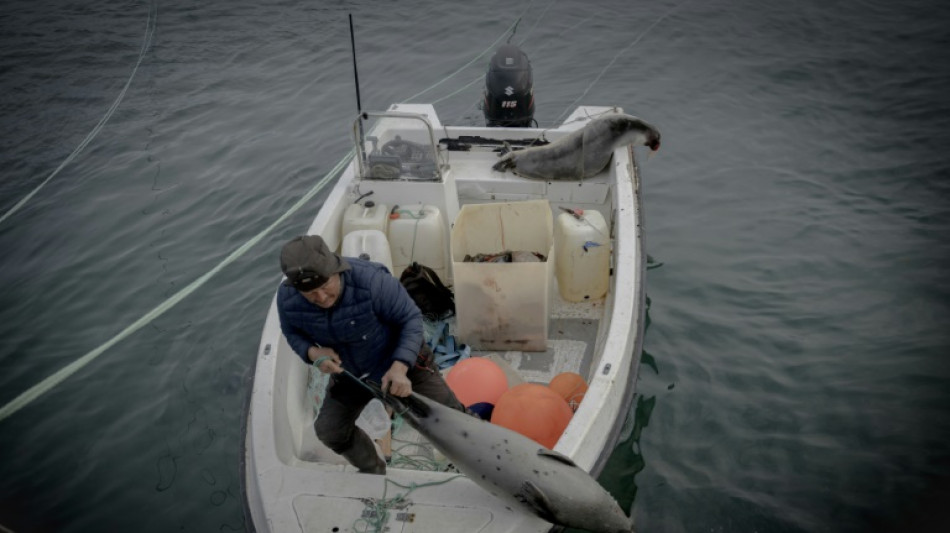
-
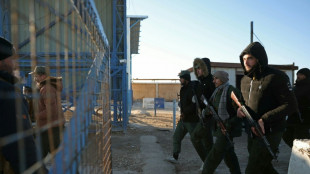 Syria army enters Al-Hol camp holding relatives of jihadists: AFP
Syria army enters Al-Hol camp holding relatives of jihadists: AFP
-
Brook apologises, admits nightclub fracas 'not the right thing to do'

-
 NATO chief says 'thoughtful diplomacy' only way to deal with Greenland crisis
NATO chief says 'thoughtful diplomacy' only way to deal with Greenland crisis
-
Widow of Iran's last shah says 'no turning back' after protests
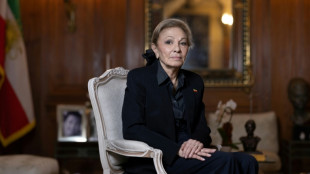
-
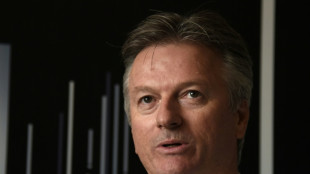 Waugh targets cricket's 'last great frontier' with European T20 venture
Waugh targets cricket's 'last great frontier' with European T20 venture
-
Burberry sales rise as China demand improves
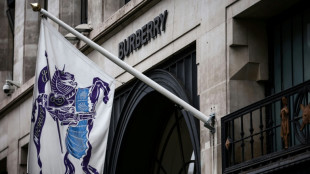
-
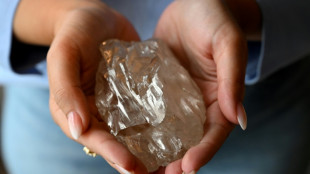 Botswana warns diamond oversupply to hit growth
Botswana warns diamond oversupply to hit growth
-
Spaniard condemns 'ignorant drunks' after Melbourne confrontation

-
 Philippines to end short-lived ban on Musk's Grok chatbot
Philippines to end short-lived ban on Musk's Grok chatbot
-
Police smash European synthetic drug ring in 'largest-ever' op

-
 Japan to restart world's biggest nuclear plant Wednesday
Japan to restart world's biggest nuclear plant Wednesday
-
South Korean ex-PM Han gets 23 years jail for martial law role

-
 Alcaraz, Sabalenka, Gauff surge into Australian Open third round
Alcaraz, Sabalenka, Gauff surge into Australian Open third round
-
Over 1,400 Indonesians left Cambodian scam groups in five days: embassy
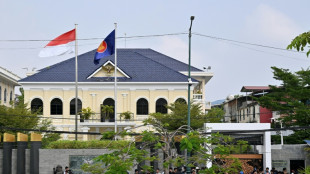
-
 Raducanu to 're-evaluate' after flat Australian Open exit
Raducanu to 're-evaluate' after flat Australian Open exit
-
Doncic triple-double leads Lakers comeback over Nuggets, Rockets down Spurs

-
 Bangladesh will not back down to 'coercion' in India T20 World Cup row
Bangladesh will not back down to 'coercion' in India T20 World Cup row
-
Alcaraz comes good after shaky start to make Australian Open third round

-
 Trump departs for Davos forum again after switching to new plane: AFP
Trump departs for Davos forum again after switching to new plane: AFP
-
Impressive Gauff storms into Australian Open third round

-
 Dazzling Chinese AI debuts mask growing pains
Dazzling Chinese AI debuts mask growing pains
-
Medvedev battles into Melbourne third round after early scare

-
 Denmark's Andresen upstages sprint stars to take Tour Down Under opener
Denmark's Andresen upstages sprint stars to take Tour Down Under opener
-
Turkey's Sonmez soaks in acclaim on historic Melbourne run

-
 Sheppard leads Rockets to sink Spurs in Texas derby
Sheppard leads Rockets to sink Spurs in Texas derby
-
Sabalenka shuts down political talk after Ukrainian's ban call
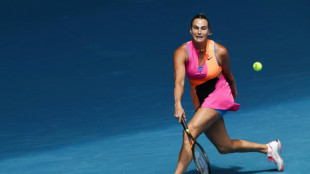
-
 Trump's plane returns to air base after 'minor' electrical issue: White House
Trump's plane returns to air base after 'minor' electrical issue: White House
-
Barcelona train crash kills 1 in Spain's second deadly rail accident in days

-
 North produces enough nuclear material a year for 10-20 weapons: S. Korea president
North produces enough nuclear material a year for 10-20 weapons: S. Korea president
-
Japan ex-PM Abe's alleged killer faces verdict
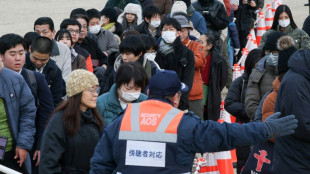
-
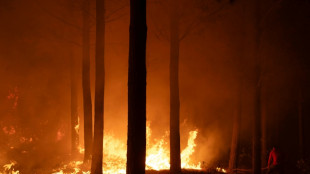 Climate change fuels disasters, but deaths don't add up
Climate change fuels disasters, but deaths don't add up
-
Stocks stable after tariff-fuelled selloff but uncertainty boosts gold

-
 What growth?: Taiwan's traditional manufacturers miss out on export boom
What growth?: Taiwan's traditional manufacturers miss out on export boom
-
'Super-happy' Sabalenka shines as Alcaraz gets set at Australian Open

-
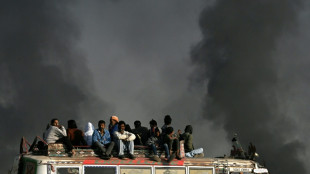 With monitors and lawsuits, Pakistanis fight for clean air
With monitors and lawsuits, Pakistanis fight for clean air
-
Sabalenka sets up potential Raducanu showdown at Australian Open

-
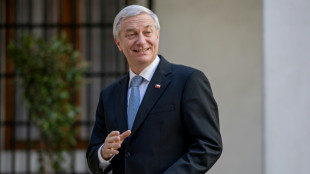 Chile president picks Pinochet lawyers as ministers of human rights, defense
Chile president picks Pinochet lawyers as ministers of human rights, defense
-
Osaka says 'I'm a little strange' after Melbourne fashion statement
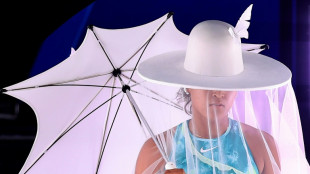
-
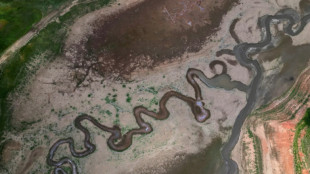 UN report declares global state of 'water bankruptcy'
UN report declares global state of 'water bankruptcy'
-
Trump heads for Davos maelstrom over Greenland

-
 Ukraine's Oliynykova wants Russian, Belarusian players banned from tennis
Ukraine's Oliynykova wants Russian, Belarusian players banned from tennis
-
Kasatkina cannot wait to be back after outpouring of Melbourne support

-
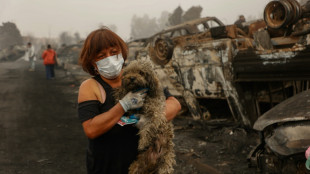 Chile blaze victims plead for help from razed neighborhoods
Chile blaze victims plead for help from razed neighborhoods
-
Russian minister visits Cuba as Trump ramps up pressure on Havana
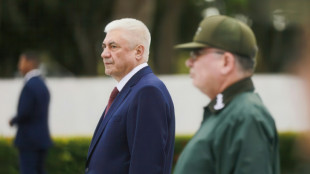
-
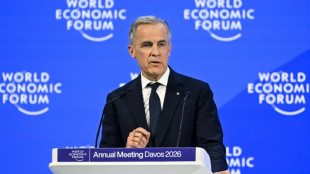 World order in 'midst of a rupture': Canada PM Carney tells Davos
World order in 'midst of a rupture': Canada PM Carney tells Davos
-
Senegal's 'historic' AFCON champs honoured with parade, presidential praise

-
 Audi unveil new car for 2026 Formula One season
Audi unveil new car for 2026 Formula One season
-
Man City humiliated, holders PSG stumble, Arsenal remain perfect

-
 Vinicius, Real Madrid need 'love' not whistles: Bellingham
Vinicius, Real Madrid need 'love' not whistles: Bellingham
-
Late Suarez winner stops Champions League holders PSG in Lisbon


Inuit hunters blame cruise ships as narwhal disappear
To hunt the narwhal, whose long tusk was the unicorn horn of medieval myth, you need absolute silence.
So much so that the Indigenous hunters of the Scoresby Sound in eastern Greenland forbid their children from throwing pebbles into the water lest they spook the spiral-tusked whales.
Taught to hunt by his grandfather, Peter Arqe-Hammeken, 37, tracks narwhal during the brief Arctic summer.
But they are getting rarer and rarer.
For in this fjord brimming with icebergs, the quiet of the hunt has been broken by new arrivals -- cruise passengers rushing to see Inuit culture before it is too late.
This summer around 60 vessels ranging from sailing boats to large cruise ships arrived at the village of Ittoqqortoormiit at the mouth of the fjord system -- the largest in the world -- in the month when it was free of ice.
While some view Arctic tourism as a means to reinvigorate this remote community some 500 kilometres (310 miles) from the nearest settlement, others worry it could destroy the last surviving Inuit hunting societies.
"A week ago there were hunters out there, trying to catch narwhals. But there were a couple of ships going into them," Arqe-Hammeken told AFP, who said cruise ships were scaring off the wildlife.
"When they come to the village, it's okay. But when they come to the hunting ground, that's not good."
In the swiftly warming Arctic, where temperatures are rising up to four times faster than the global average, the Inuit are threatened at every turn.
- Vanishing hunting grounds -
"Hunters live from hunting here. They have kids," said Arqe-Hammeken, who was born and bred in Ittoqqortoormiit and fears for their traditional way of life, of which narwhal meat is a key part.
"Narwhals are very important for the community" and for Greenland food culture, said teacher Jorgen Juulut Danielsen, a former mayor of the village, with "mattak" -- raw narwhal skin and blubber -- a traditional delicacy.
The Inuit hunt the toothed whales with harpoons and rifles under strict quotas, with the once lucrative export of the tusks banned since 2004.
But climate change is squeezing the narhwal's habitat and scientists warn that they will disappear totally from eastern Greenland if hunting is not banned.
Numbers have fallen so much that hunters could not find enough to reach the quota in 2021.
Weaker ice because of warming is also making it difficult to stalk seals -- another staple of the local diet -- at their breathing holes in the ice.
"There's no ice now when before there was ice the whole year," said Arqe-Hammeken, looking out to sea from Ittoqqortoormiit.
His grandfather used to regale him with tales of catching seals just outside the village. Now hunters must journey deep into the fjord to find them.
"Thirty years ago there were a lot of hunters. Today there are only 10 or 12," said Arqe-Hammeken.
- Pollution from afar -
Nothing grows on the barren tundra, and with cargo ships only making it through the icy fjord once a year "it's important we get (our nutrients) from the animals we hunt here locally," said Mette Pike Barselajsen, who runs the local travel agency Nanu Travel.
"What we hunt is very important for our culture," she added, with traditional clothes like polar bear trousers and sealskin kamik boots still used for hunting and for religious ceremonies.
But in July a study in the Lancet Planetary Health found that the villagers had some of the world's highest concentrations of cancer-causing PFAS in their blood from eating seal, narwhal and polar bear, even though they live far from the sources of the pollution.
The "forever chemicals" from trainers, waterproof clothing, carpets, fire foam and pesticides are carried north on ocean currents before mounting the food chain to the Inuit.
With so much against them, some hunters are shifting to fishing halibut to supplement their income, said Danielsen. Others are turning to tourism.
- Last-chance tourism -
Ittoqqortoormiit and its colourful houses could hardly be more scenic, perched on a rocky peninsula overlooking the mouth of Scoresby Sound surrounded by glaciers.
Its once quiet paths are now filled with groups of cruise tourists snapping pictures of polar bear hides hanging from the houses.
"One wonders how people live here," said Christiane Fricke, a tourist from Germany drawn like many to experience the traditional culture before it disappears.
Many hunters are already guiding tourists or taking them dog sledding.
"It's a huge help for the hunters to have income from tourism as well," said Barselajsen.
But others are afraid that the cruise ships are making hunting unfeasible.
Danielsen, the former mayor, admitted there is conflict between those eager to embrace tourism and those who fear it could erode indigenous culture, especially hunting narwhals.
"Tourism definitely poses a threat to the traditional way of hunting and fishing in Ittoqqortoormiit," said geographer Marianna Leoni of Finland's University of Oulu, who knows the village well.
But the authorities are "desperately looking for any sort of opportunity to keep the village alive," she told AFP.
Tourists pay up to 20,000 euros ($21,000) for the cruises, with almost all of the money going to foreign companies. So the Greenland government is introducing a cruise passenger tax so locals get a share of the windfall.
But with the charge less than seven euros a tourist, the Inuit are not getting "much in return", said Leoni.
T.Zimmermann--VB



